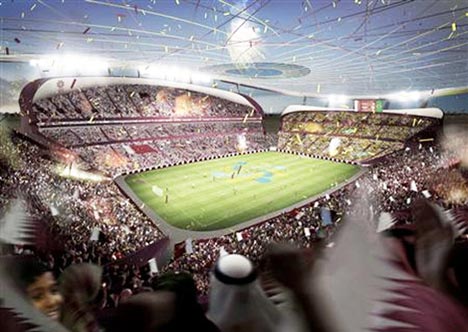 Doha, Oct 5: Fifa has launched a consultation process to decide whether to stage the 2022 World Cup in Qatar outside the traditional June-July slot and will not make a decision until next year, president Sepp Blatter said on Friday.
Doha, Oct 5: Fifa has launched a consultation process to decide whether to stage the 2022 World Cup in Qatar outside the traditional June-July slot and will not make a decision until next year, president Sepp Blatter said on Friday.
“The executive committee decided to launch a consultation process among main stakeholders for Qatar 2022 dates,” Blatter said on Twitter. “No decision will be taken before 2014 WC (World Cup)”.
Qatar was awarded the right to host the competition in December 2010 in a decision based on its plans to stage the event in June-July using air-conditioned stadiums to combat the fierce heat.
Despite Qatar’s assurances that the plan is viable, there has been widespread concern over the health of the players and visiting fans in the searing conditions of the desert summer.
Blatter said in July that he would propose a move to a cooler time of year and that he expected the executive committee to agree with him.
European soccer’s governing body UEFA agreed last month that the World Cup should be moved, with all 54 member associations backing the proposal.
However, there have been demands for greater consultation from other stakeholders, led by the powerful European Clubs Association (ECA) which has more than 200 members including the world’s richest and most powerful clubs.
ECA president Karl-Heinz Rummenigge said in September that, with the competition still nine years away, there was no need to rush into a decision.
Clubs are worried about the financial impact of hosting the World Cup outside its traditional June-July slot, as it would force them to reschedule domestic leagues.
Rummenigge has suggested that April 2022 would be an alternative while January-February and November-December are also possibilities, although the first two months of the year will also see the Winter Olympics taking place.
Blatter said Fifa could not in get involved in labour issues in any country, speaking about claims about alleged abuses against workers involved in construction projects linked to the World Cup.
But he added that at the same time Fifa could not ignore the allegations first made in Britain’s The Guardian newspaper, which claimed that dozens of expatriate Nepalese workers had died and thousands of others worked in conditions akin to “modern-day slavery” in the Gulf state.
“I express all my sympathy and regret for anything that happens in any country where there are deaths on construction sites, especially when they are related to a World Cup,” he told a news conference.
“We should also say that workers’ rights are the responsibility for Qatar and the (construction) companies, there are many European companies working there and these are also responsible for the conditions of workers; it’s not Fifa’s responsibility but we can’t turn a blind eye,” Blatter said.







Comments
Very nice post. I just stumbled upon your blog and wanted to say that
I've truly enjoyed browsing your blog posts. In any case I'll be subscribing to your rss feed and I hope you write
again very soon!
Here is my web blog - online slots
real cash: http://www.izap.fr/ADO0
Add new comment